 It's hard to break into a new church, Sunday School class, or youth group. People have known each other and have developed relationships going back years. Yet, successful church assimilation –getting people active in the church– increases discipleship because people will get involved in small groups and be more inclined to participate in Bible studies if welcomed. There are many ways a visitor or new member will not feel welcomed. The lack of signage indicating to people where classes and age groups are located, not being warm and welcoming, looking down on someone for how he or she is dressed -- all these things can be hindrances to people. Walking into a room full of strangers who don't say "hello," or offer to change up the seating arrangements to make room, is intimidating to new people. Look, we are to emulate Jesus. He did not discriminate against anyone. He showed kindness to the poor, the sick, the powerless, and the destitute. He was comfortable talking with centurions, prostitutes, and priests. While He hand-picked the twelve disciples, He went out of His way to make sure the lost were found, the unclean were made whole, and the discouraged encouraged. Are we doing these things in our churches? What are "cliques"? One of the biggest stumbling-blocks to getting people to come again and again to church and become active in a small group is the presence of cliques. Cliques are small, exclusive groups of friends that by their definition exclude people who are not in that exclusive group. We all have those groups of people with which we associate, either in the church or socially, and call these people family. I know I do. The problem lies in the perception that a church has all cliques and you cannot get to know people and break into small groups to learn about Jesus because you're excluded, for no reason other than you're not them. I first started going to church when I was 12 years old. I accepted Christ as Savior and had a thirst to know more about Him. My youth Sunday School class, which I really liked, had an announcement one Sunday they were having a social and Bible study at a member's house, so my mom drove me over. I soon found out that there would be no BIble study but a lot of watching MTV back in the day when it was all about music. Inside jokes were the norm. Teens laughed and poked fun at one another, talking and eating chips and dip. I'd try to initiate conversations but was fairly shut out. No one would try to talk with me; when I wanted to play pool with a few of them, they suddenly wanted to go watch the TV, leaving me quite literally holding the eight ball. I didn't go back. While I'd go to worship service, it was months before I'd go back to the Sunday School class. When I went back, I learned that a member of our class had been out for a couple of weeks due to a broken leg; a card was passed around for signatures. I thought to myself, I've been out for a couple of months and haven't received any cards. It stung. It stung hard. It said to this young, baby Christian: you're not one of us; you're not wanted; we don't want you here. Are those the kind of messages you want your church or small group to project? Stumbling-Blocks Before the youth event, I was learning a great deal about the Bible in class. Soaking it up. After the youth event, I just went to worship and while I learned a great deal from the amazing Dr. Rick Blackwood in just his sermons, I know now that that shy 12-year-old girl should have also been in a small group with peers her own age. The cliques in the class and youth group put stumbling-blocks in my walk of faith. It tripped me up. But it's not just in youth groups. Snobbery about who one talks with can happen with the adult crowd, too. There is too much political maneuvering within church groups. We're supposed to be showing the love of God to all, and there we are, shunning our brothers and sisters within our own walls. Paul addressed cliques in his message to the church at Corinth, saying, "I appeal to you, brothers and sisters, in the name of our Lord Jesus Christ, that all of you agree with one another in what you say and that there be no divisions among you, but that you be perfectly united in mind and thought," [1 Corinthians 1:10]. What is more dividing than cliques? What can be done? Sometimes I make pie crust from scratch. Recipes call to take butter and chunk it into flour. I take a special pastry blender and smoosh the lumps out. I carefully knead the dough until it's all of one likeness and there are no lumps. Cliques are the lumps of the church and need to be kneaded from the top down. Church leadership should be careful not to socially associate too much with the same set of people over and over, lest there be a perception of favoritism. It is good for the leadership of the church to try to have real conversations with many people instead of the most active members, the most giving members, or the members with community political clout. Sunday School teachers and small group leaders: if you have the same people sitting together every Sunday, do something about it. Buy a bag of colored candy and hand each person a different color: red, blue, green, yellow, red, blue, green, yellow. Have all the yellows sit together, the greens, the reds, etc. Allow the "new" groups time to get acquainted. Force the mixing of the dough, if we remember the pie crust analogy. Just as Jesus would go up to the lonely, be aware of anyone sitting alone, Sunday after Sunday. Introduce that person to others. Facilitate people getting to know one another. If you have covered dish suppers, encourage the creation of a kid's section with just children so the adults can mix and mingle without For people trying to break into a church, please don't give up. Keep going. Take the initiative. If you do anything, show the congregation how to be Jesus. Do unto others what you would have done to you -- not what you've had done to you. In Christ, Terrie (C) 2018 Terrie McKee
2 Comments
Jeanne mott
1/31/2018 09:36:58 am
Great article. I loved Flint Groves because of Ronnie's preaching, and a handful of good friends there. But yes, this goes on at every church, even Flint Groves. 😰
Reply
Terrie
1/31/2018 09:45:37 am
This post wasn’t directed at any particular church, but yes, this does happen in every congregation. Each church body is made up of broken individuals who are still human. Praising God for the sin-covering blood of the Cross!
Reply
Leave a Reply. |
Recent PostsAdvertisingThis post may contain affiliate links to products and/or services, including those available on Amazon.com, as Near Your Altar is a participating member in the Amazon Affiliate Program in addition to other retail affiliates. These affiliate links help provide for this website as well as a small income to my family and I. Please consider clicking on the links to purchase or to browse the affiliate's website, which will open in a new window. We thank you for your support. ~ Terrie
Read Disclosure Policy here |





